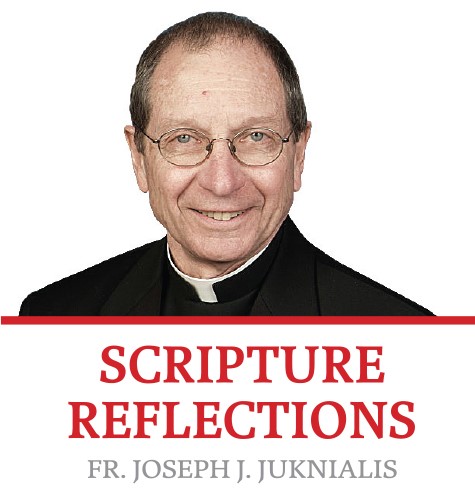Scripture Readings, Feb. 13, 2022
Feb. 13, 2022
Sixth Sunday in Ordinary Time
Jeremiah 17:5-8
1 Corinthians 15:12, 16-20
Luke 6:17, 20-26
Where we put down our spiritual roots matters. For some, the 50-year-old adage to “bloom where you are planted” may offer a bit of wisdom. The prophet Jeremiah of this week’s first scripture reading, however, reminds us that if we find ourselves “standing in a lava waste, a salt and empty earth,” we won’t do much blooming. We’ll be no more than a dried and shriveled barren bush. So, where we plant our inner spiritual lives makes a difference.
For many, this week’s Gospel reading seems to sap all the joy out of life. Woe to you if you have money to spend, a banquet to feast on, fun and laughter to dress up your days. Woe to you, it seems to caution, because when you die the opposite will be your lot.
What’s so wrong, we wonder, with having cash in our pockets and food on our tables and a good time once in a while? Life can be downright dreary and a drudgery otherwise.
The answer, of course, is that there is nothing wrong with any of that – nothing at all, unless that’s where we put down our roots. In other words, if that’s what our life is all about, if that becomes what we live for, our sole purpose, sooner or later we are likely to discover our lives have become a barren bush standing in a lava waste.
“Woe to you who laugh now, for you will grieve and weep,” cautions the Gospel. One day, a woman, perhaps in her mid-30s, came by wanting to talk. I had seen her around the parish I was in at the time. She was always friendly and a delight to be around. People enjoyed being with her. Wherever she went, she was a social sparkler. She was fun to know and seemed to have the life many others wished to have. As she talked about her life, however, her eyes began to tear up. She talked about how as a teenager she had worked to be popular and well liked. She wanted to have a good time. It all carried her successfully into becoming an adult, she thought. But now, it seemed that no one knew the real her. Everyone expected her to be lively and funny, but when she tried to be serious, they all thought something was wrong. They wanted her to be their spark, but it wasn’t who she really was. She was now lonely and wanted to know what her life could be about. And that was what she and I then explored – how to find meaning in a life that seemed to her to be without much meaning beyond having a good time. Where any of us put down our roots matters.
“Woe to you who are rich, for you have received your consolations,” cautions the Gospel. Most of us spend our early adult years putting together the pieces of life we’ve dreamt of – a good job (if we’re fortunate, one we also enjoy), a decent salary and place to live, good friends who think well of us. It’s all of what we think we’re supposed to do. Then in mid-life, we begin asking ourselves, “What’s it all about, Alfie? Is this all there is?” If we’re fortunate, we begin redirecting our energies more outward than inward, and life then begins to take on a different glow. We begin to realize there is more to life than what we’ve been about the previous 25 or 30 years.
So, we come back to the idea of where we plant ourselves, where we set down our spiritual roots, our values and our goals for life. For most of us, that changes and evolves as we go through life, and probably more than once. What we mean by living the good life begins to be redefined. It all takes a bit of the wisdom found in reflective silence, in prayer, in asking ourselves if life as we live it is really bringing about what we’ve hoped for, and if not, why not.
Jesus didn’t come to suck the joy out of life but to give us a heads up for life that is full. He sought to draw our attention toward what he called the reign of God. In other words, the reign of inner peace and that joy that comes with caring about others and a life of deep love over the long haul. All of that is ultimately behind all of the longings with which we live. He hoped we might avoid the lure that can become a lava waste. He hoped that we might become “like a tree planted beside the waters that stretch out its roots to the stream.”
Reflection Questions
What have been some of the “lava wastes” in which you’ve put down roots over the course of your life?
What have been the genuine life-saving streams for you?

